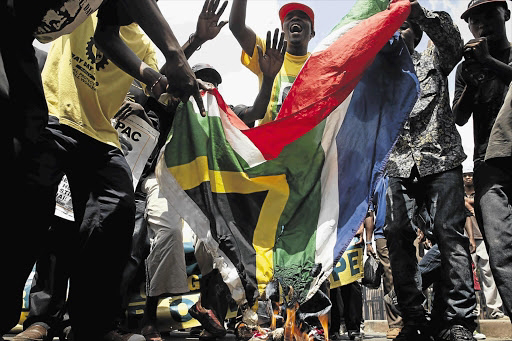Before you wonder why an undiverse person like myself is writing on the identity of such a diverse land, ask who would be qualified to write on such a topic? Everyone has their own biases & if anything, I write with some knowledge of history & little knowledge on genetics so who better?
If we're going to go by genetics alone - there is no such thing as a South African. With genetics, you're either black (African), white (European), Indian or Asian. No inbetweens. Coloured or mixed-race people are just a mixture of two or more groups & not a distinct heritage on their own. My logic goes, you are your surname & more importantly you are your parents' child. Whatever your parents identify as is what you inherently are & quiet often this identity is unclear in the modern age of globalisation so your surname becomes ever more important.
What of naturalisation? In the past, there were "rights-of-passage" to naturalisation. Mainly you would show that you speak the local language & follow the norms & laws of the land, the chief or king would then allot you a place to live within his land. The problem with South Africa is that there are too many distinct groups of people so naturalisation becomes tricky because we don't know ourselves what we are naturalising outsiders to. South Africa's naturalisation seems to be heavily favourable to wealthy English-speaking people. So we have to really ask, "What is a South African?" if our brothers just across the border find it harder to be naturalised than Europeans. The majority of South Africans speak Zulu but the concept of South Africa was from a Dutchman & later both Dutch & English. The majority of South Africa are black people but they live under Roman-Dutch law. So what is South Africa? Is it one of those sexy, island nation, mixed-race, corrupt republics or just a mistake? We have to go back in history to figure out what South Africa is & whether it's formation makes sense to it's citizens.
Initially, the land where South Africa is had established African kingdoms which still exist today & still claim large parts of South Africa. When the Dutch arrived, they thought they were establishing themselves a town at the Cape of Good Hope but had to fight some wars with the local Khoi & San tribes of the Cape. Then the Cape was invaded by the British - so the Dutch (with some Huguenots), some of which had made children with indigenous Khoi fled inland to clash with the established African kingdoms. They formed the South African Republic (Zuid Afrikaansche Republiek) with the disapproval of the indigenous people. So if the Dutch took over South Africa, why aren't we all speaking Dutch/Afrikaans? Well, the British attacked the Dutch in the Zuid Afrikaansche Republiek after the discovery of gold so no European power managed to get a true monopoly in South Africa. After the Anglo-Boer War, the Dutch were put into concentration camps & this is where the Dutch of South Africa grew to resent the British. They fled from the British at the Cape only for the British to follow them & defeat them in battle. While all these Europeans were squabbling, the African kingdoms still existed albeit with diminished power & as South Africa got modernised, indigenous languages moved to the cities as people moved from tribal homesteads to find work when their cattle were taken by taxes imposed by the British. And today, we find people resentful of Europeans in South Africa but too complacent to advocate for their indigenous African sovereignty. There are definitely solutions to our quagmire but rich whites don't want to hear them & indigenous Africans are too complacent to be true nationalists as said before. To many people of European heritage, it is still their land even though they are well aware of the history of this land. What makes it further more awkward is that this is Africa & they would've been better off conquering some land in Europe (e. g. Belgium & Guernsey) not in a place where they are so phenotypically & culturally different from the indigenous people on the far side of Africa. This is why Adolf Hitler could've gotten away with "the Anschluss" because Austria is a German-speaking land. In Austria he would've gotten his lebensraum but as we all know, he got greedy. So the obvious rules when it comes to successful invasions is to invade lands with 1) people that look like you & 2) speak the same/similar language as you otherwise it just looks crass. Provided that the people you are trying to invade do not defeat you, you should be successful in unifying the land based on similarities & not a tricky, forged identity.
As long as we still speak our indigenous languages & have our traditional leaders in South Africa. Our indigenous leaders have full right to not recognise South Africa as a country & claim that their lands are under illegal occupation by an Anglo-Dutch entity.
So who is South African? To the indigenous precolonial people of South Africa, a South African is an illegal invader from Europe. And in the place of South Africa, there should be Venda, Pedi, Tsonga, Ndebele, Zulu, Swazi, Khoi, San & Xhosa countries.
We are only "South African" because we do not believe that we had identities & countries before South Africa. And this is who a South African is; a Nguni-speaking, 27-year-old, black lady who believes she's an invader from Europe.
What was meant to be a country for all is becoming a country resented by both blacks & whites. And indeed I did mention solutions in the beginning. We have two main workable solutions that would end the Babylon of South Africa:
2) The creation of three new states (see map below)
Thanks for reading.




Comments